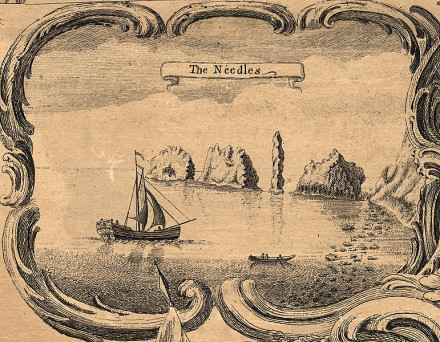History
The ship Kampen (or Campen) set sail heading for Batavia in the Dutch East Indies on 12 October 1627. It was her maiden voyage. The ship was lost on the treacherous Needles at the Island of Wight in the UK. The crew of 160 sailors, soldiers and merchants reached the land safely. They had succeeded in taking with them all but two chests of silver coins on board. But still, much of the cargo remained on board, providing us with a view of what the cargo of such a ship contained.
In the years 1627 and 1628, a part of the coins on board the wreck was salvaged from the site by Dutchman Jacob Johnson. He was known within the Company as Jacob the Diver, as he was the person who tried to salvage shipwrecks and their artifacts around British coasts.


Description
The Kampen . It carried about 30 guns.
| People on board | 160 |
|---|---|
| Tonnage | 300 ton (150 last) |
Status
The Kampen sank just south of the Needles. Shortly after the wreck Dutch salvor Jacob the diver and local merchant Robert Newland began to explore the wreck. They handed five cannons, 6600 kilograms of lead and 2635 coins to the authorities.
The vessel was rediscovered in June 1979 at the Needles near the Island of Wight. Not much was left of the ship. However, some of its cargo still remained at the site of the wreck. During the expeditions that followed its discovery in 1979, some of the ship’s cargo was found. Lead ingots and about 8000 coins were part of the cargo finds. The coins consisted of Reales and Lion Coins (Leeuwendaalders). Lead was a common item of commerce in the 17th century.

The lion coin
The Leeuwendaalder is one of the oldest silver 'coins' in the world and has served as a model for many coins in many countries. The Leeuwendaalder is the first coin that was minted autonomously by the Seven Provinces. The Leeuwendaalder represents the independence of the Seven Provinces who oppose the power of their Spanish ruler and is a sign of strength through unity.

References
- uitreis boek, 1.04.02/invnr/4932.
- Larn, Richard (ed.) (1985).
The wreck of the Dutch East Indiaman Campen on the Needles rocks, Isle of Wight, 1627, part 1,22.
The International Journal of Nautical Archaeology and Underwater Exploration vol. 14, no. 2 (May 1985).
pp 1,31-97-118.